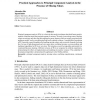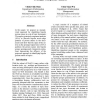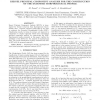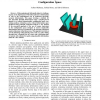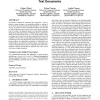ICASSP
2011
IEEE
14 years 4 months ago
2011
IEEE
An extension of principal component analysis called ipPCA has been proposed earlier for analyzing structure in genetic data. This non-parametric framework iteratively classifies ...
JMLR
2010
14 years 7 months ago
2010
Principal component analysis (PCA) is a classical data analysis technique that finds linear transformations of data that retain the maximal amount of variance. We study a case whe...
102
click to vote
COLING
2010
14 years 7 months ago
2010
In this paper, we propose an unsupervised approach for identifying bipolar person names in a set of topic documents. We employ principal component analysis (PCA) to discover bipol...
105
click to vote
IGARSS
2009
14 years 10 months ago
2009
Kernel Principal Component Analysis (KPCA) is investigated for feature extraction from hyperspectral remotesensing data. Features extracted using KPCA are used to construct the Ex...
ICRA
2010
IEEE
14 years 10 months ago
2010
IEEE
Abstract-- Motion planning of deformable objects is challenging due to the high degrees-of-freedom inherent in deformation as well as the computational cost of producing physically...
SAS
2010
Springer
14 years 10 months ago
2010
Springer
Numerical Abstract Domains via Principal Component Analysis Gianluca Amato, Maurizio Parton, and Francesca Scozzari Universit`a di Chieti-Pescara – Dipartimento di Scienze We pro...
MIR
2010
ACM
14 years 10 months ago
2010
ACM
A novel backwards viewpoint of Principal Component Analysis is proposed. In a wide variety of cases, that fall into the area of Object Oriented Data Analysis, this viewpoint is se...
102
click to vote
CIKM
2010
Springer
14 years 11 months ago
2010
Springer
We present a method for automated topic suggestion. Given a plain-text input document, our algorithm produces a ranking of novel topics that could enrich the input document in a m...
117
click to vote
BMCBI
2010
14 years 12 months ago
2010
Background: Data from metabolomic studies are typically complex and high-dimensional. Principal component analysis (PCA) is currently the most widely used statistical technique fo...
RAS
2002
14 years 12 months ago
2002
This paper proposes a statistical, non-feature based, attention mechanism for a mobile robot, termed Information Sampling. The selected data may be a single pixel or a number scat...

